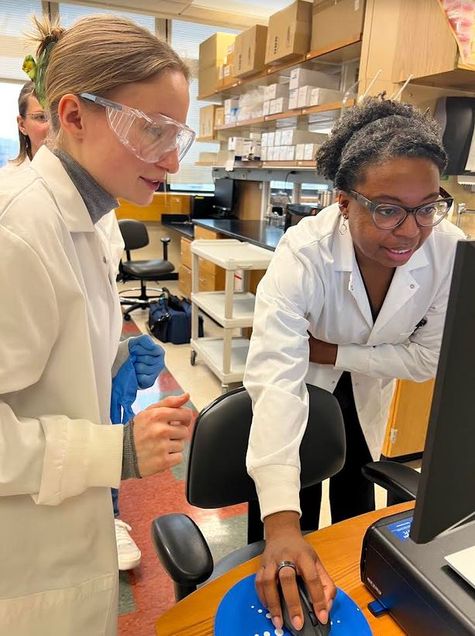Developing a new liquid biopsy tool to track tumors
With her potentially revolutionary proposal for a more effective, minimally invasive method of detecting tumor activity, Assistant Professor Erica Pratt (BME, MSE, CAMED) has been named one of seven 2024 Rita Allen Foundation Scholars, joining a prestigious group of innovative researchers in cancer, immunology, and neuroscience.
A liquid biopsy expert, Pratt is focusing her research on protein kinases. These are enzymes that regulate protein expression, and they’re found in trace amounts throughout the blood stream, within the cells that a tumor sheds
“If we have the technology to isolate these circulating biomarkers, then every time a cancer patient comes in to a clinic, we can draw blood and then obtain tumor-specific information,” says Pratt, who is the Moorman-Simon Interdisciplinary Career Development Professor at ENG. That data could indicate whether a tumor is metastasizing, or whether a particular treatment is working or an alternative should be tried.
“The caveat,” says Pratt, “is that these biomarkers are extremely rare. It’s a one-in-a-million event, so it’s truly a needle-in-a-haystack problem, and you need really innovative technology to be able to isolate these cells and analyze them in any meaningful way.”
That’s just what Pratt aims to do with the Rita Allen Foundation funds—up to $110,000 per year for three years. She is developing what would be the first probe capable of detecting circulating tumor cell kinase activity, providing patients and clinicians with consistent, up-to-date insights as a tumor evolves and responds to treatment.

“If you look at kinases, you get a high-level overview of information flux throughout a cell,” Pratt says. “What is a cell committing a lot of resources to? What are the pathways it’s trying to activate and control? And that can inform what kind of therapies should be selected.”
Moreover, since the technology can be used to evaluate treatment efficacy, it should have drug development and clinical trial applications as well.
The students in Pratt’s lab hail from a variety of disciplines, including biomedical engineering, chemical biology, and cell and molecular biology. “The project is inherently multidisciplinary,” she says. “We’re working at the interface of physical sciences and oncology.”
“Obviously, the award is transformative,” says Pratt. “This research has a lot of moving parts, a lot of high-risk elements. The application is exciting, but there is a lot of work ahead of us to get there, so having the investment from the Rita Allen Foundation, where they see the potential and are willing to help nurture and grow it, is really crucial for the type of research that we do.”
In addition, Pratt credits her Moorman-Simon Interdisciplinary Career Development Professorship (CDP). “The CDP has accelerated my research program and was integral to generating the foundational preliminary data used in my proposal,” she says.
In the long run, Pratt hopes the project will make a difference in the lives of cancer patients. “Cancer is something that affects so many people every day,” she says, “and as an engineer I always wanted to do something that tied to a real-life impact.”
